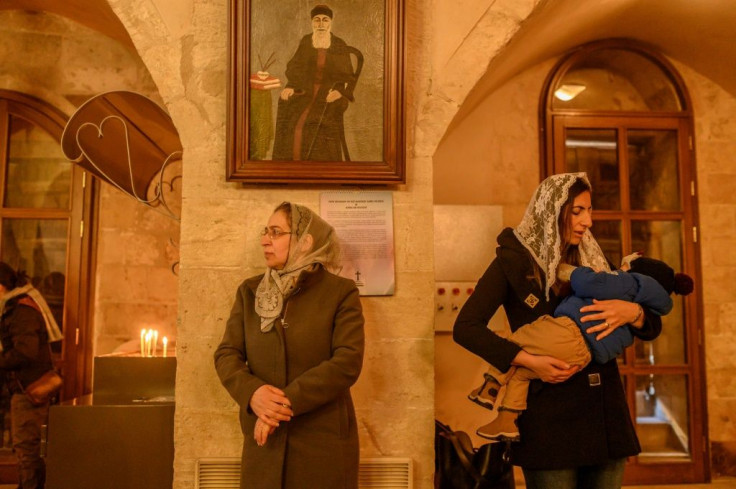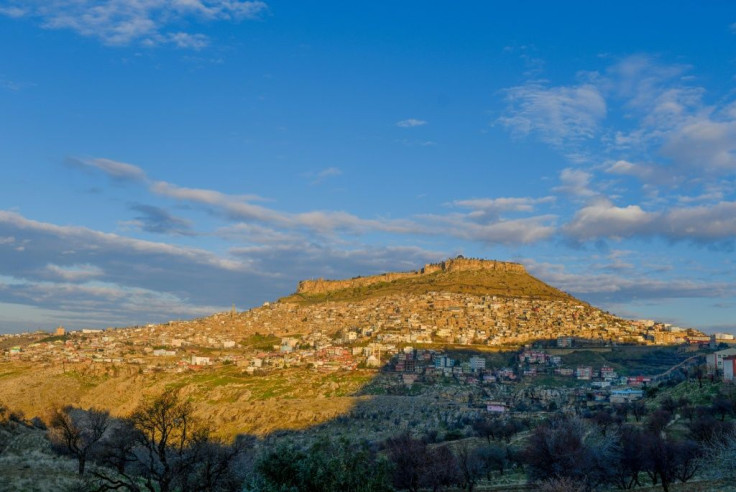Assyrian Christians Fear For Their Future In Turkey
Inside the sixth century church in southeastern Turkey, dozens of Assyrian Christian women, men and children in their Sunday best attend a service, one of only a few held in their ancient homeland.
They are among the nearly 4,000 Assyrians left in the region after violence and poverty forced the community to leave Turkey in the 20th century.
They are now scattered across Europe, with over 100,000 living in Germany, nearly 100,000 in Sweden and tens of thousands in Belgium, France and the Netherlands.
Assyrian Christians, also known as Syriacs, are part of the eastern Christian tradition and pray in Aramaic, which Jesus is believed to have spoken.
Yuhanun Akay, 40, lives in the historic region of Tur Abdin (meaning "Mountain of the servants of God" in Syriac), in the centuries-old village of Gulgoze in Mardin.
The village, known as Ain Wardo, meaning "eye of the rose" in Syriac, was once home to hundreds of Assyrian families, where they farmed, prayed and educated their children.

Now only three families remain including Akay, a farmer and father-of-eight.
"In the past there were 200 Syriac Christian families, and seven priests in the village. We had three churches, so each neighbourhood had a church," he told AFP.
"Every Sunday there would be a service in all three churches and they would be full."
There are 2,500 churches and 300 monasteries in Tur Abdin, according to Evgil Turker, head of the Federation of Syriac Associations.
Community leaders including Turker are worried over the future of the community in Turkey despite a slight recent increase in population figures.
There are around 20,000 Assyrians in Istanbul.
Like other communities, Turker said Assyrians were affected by the same economic issues and "political pressures" under President Recep Tayyip Erdogan's government.

During Erdogan's tenure as prime minister between 2003 and 2014, there had been overtures to Assyrians to return to Turkey while confiscated properties were given back to their owners.
Despite hope that this would see old villages restored to their former glory, many members of the Assyrian diaspora only come in summer but return to their homes in Europe afterwards, Akay said.
Their newly-built homes lie empty in the village.
Although the three churches endured for centuries, there has not been a priest serving the community since 2001, according to Akay.
The concern is not only religious. Akay described how he would go to a special school to learn Syriac. The school no longer exists.

"It's difficult now. There is no one to teach or educate (children)," he lamented.
With his wife, Sonia, they try to do as much as they can to teach their children about their roots and the language, and when they need a priest, they are in contact with one in the nearby town of Midyat.
Assyrians refer to the killings of their community in 1915 as a genocide ("sayfo", meaning sword), which took place around the same time as the massacre of Armenians.
Some fled to Gulgoze, Akay said, as he described people sheltering in one of the churches where his family pray today.
There was then a steady decline in the numbers of Assyrians in Turkey during the 20th century, especially in the 1980s and 1990s when many were forced to move abroad or to Istanbul because of violence between Kurdish insurgents and the state in the southeast.
Some left in search of a better life.
There were fears earlier this year that Assyrians were being targeted after a couple belonging to the Chaldean Catholic minority went missing in January in Sirnak, near the Iraqi border.
While Hurmuz Diril, 71, remains missing, his wife Simoni, 65, was found dead in March.
The arrest of Syriac Orthodox priest Sefer Bilecen on terrorism charges also caused concern, but Turker said he did not believe there was state-led targeting of Assyrians.
Back inside the sixth century church on a side street in the old city of Mardin, families solemnly listen to the priest, surrounded by images of Christ and the Virgin Mary.
People attending, including retired teacher Deniz Kirilmaz, described how life had improved since the 1990s, with greater freedom to pray.
"Living here is very important for our churches, for our monasteries, because our ancestors lived here. To continue this is very significant to us," she added.
Turker is one of those who returned to Turkey, describing how he felt a responsibility to serve his community. "This is my country," he said.
But Assyrians remain concerned over their heritage in Turkey.
"It's as if the language is slowly starting to melt away, and that's upsetting. For a religion like this, a race like this, a people like this to fade away is really bad, it's saddening," Akay said.
"God willing it will endure until the end."
© Copyright AFP 2024. All rights reserved.





















